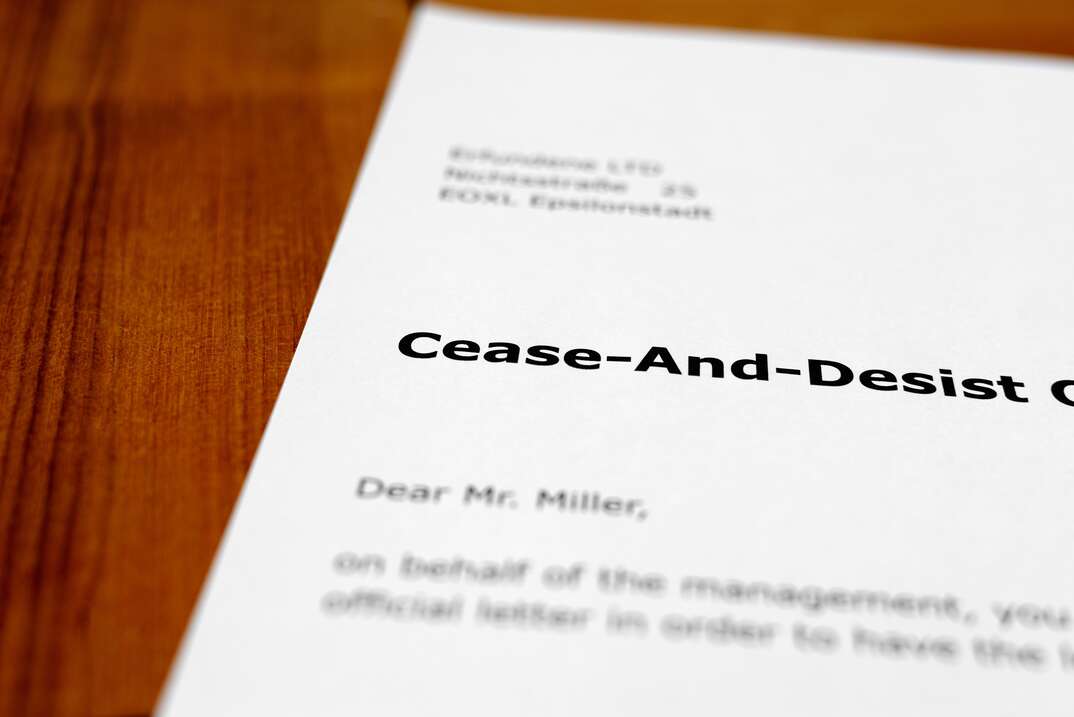What Is a Cease and Desist?

Many legal tools can be used to dissuade unwanted behavior, but few are as common as cease and desist letters. These letters explain wrongdoings and the consequences if the behavior doesn't cease — and they're a great way for the potentially wronged party to show they mean business.
But what happens if you receive one yourself? Here’s what to know.
What Is a Cease and Desist Letter?
A cease and desist letter is a strongly worded letter asking an individual or group to cease behavior that's deemed illegal or allegedly illegal. This could include spreading defamatory information online, using someone else's copyright in an unapproved manner or anything else someone believes to be a violation of civil law. Cease and desist letters, when issued legally, must relate to a civil claim, and any proposed legal action must not involve fraud, duress or extortion.
These letters tend to be written by an attorney, but they don't have to be; anyone can write a cease and desist letter. They encourage unwanted behavior to stop and may outline legal action to be taken if the requested steps aren't followed. These letters aren't mandates that must be followed, just suggestions and an explanation of potential legal consequences.
In some cases, ignoring these letters, even if a response is requested, is fine, especially if the crime being alleged is baseless. However, in others, doing so could result in real consequences if the sender follows through on threatened actions, such as a filed lawsuit.
A cease and desist letter is most likely to be sent if a person or entity is doing some sort of activity with which another person or entity disagrees. Some of the most common reasons a letter might be used include:
- IP violations
- Libel and slander issues
- Debt collection
- Harassment
- Contractual violations
More Related Articles:
- When Do You Need a Lawyer? Determine If You Need to Hire an Attorney
- What Is a Class-Action Lawsuit?
- What Is a Misdemeanor?
- What to Do After a Car Accident
- What Is Power of Attorney?
What Is a Cease and Desist Order?
A cease and desist order is similar to a cease and desist letter, except it's legally binding. Rather than coming from a company's lawyer or an individual who feels wronged, these orders tend to come from a court or other administrative agency after the wronged party petitions for relief.
These orders come in two forms: summary and final. A summary cease and desist order is issued before judicial proceedings, such as a hearing. In this case, the target of the order must respond within a stated time frame. If the person targeted by the order doesn't request a hearing within a certain amount of time, the order may become final.
Cease and desist orders can't be ignored without consequence; recipients are required to respond to the issuing agency and are prohibited from continuing the behavior outlined in the order until the issue is resolved.
Why Might You Receive a Cease and Desist Order?
The reasons for receiving a cease and desist order are similar to the situations in which a cease and desist letter may be used, including instances of libel or harassment. However, because these orders are issued by a judge or other agency, they're most common in instances where there's a solid case for a civil suit. While anyone can write a cease and desist letter, orders have a much higher legal bar to clear, as this means a judge or other authority sees legitimate instances of wrongdoing.
Cease and desist letters can range from baseless to serious, but knowing how to respond is always a benefit. Consulting an attorney, particularly in the case of a cease and desist order, can ensure any further action sticks to the letter of the law.
Elocal Editorial Content is for educational and entertainment purposes only. The information provided on this site is not legal advice, and no attorney-client or confidential relationship is formed by use of the Editorial Content. We are not a law firm or a substitute for an attorney or law firm. We cannot provide advice, explanation, opinion, or recommendation about possible legal rights, remedies, defenses, options or strategies. The opinions, beliefs and viewpoints expressed by the eLocal Editorial Team and other third-party content providers do not necessarily reflect the opinions, beliefs and viewpoints of eLocal or its affiliate companies. Use of the Blog is subject to the
Website Terms and Conditions.The eLocal Editorial Team operates independently of eLocal USA's marketing and sales decisions.



